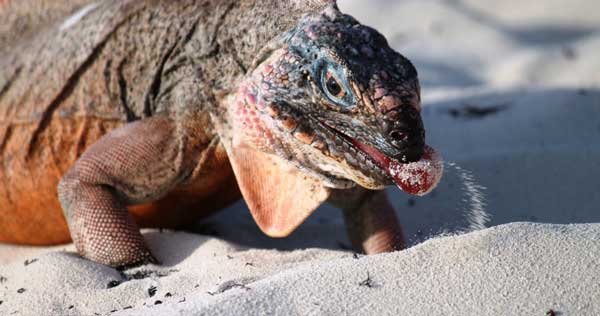
A decade ago I read about a study of “city” and “country” black bears in the Sierra Nevada. The country bears spent 13 hours a day foraging for berries, insects, and the occasional deer. The city bears slept by day in residential back yards and rummaged by night in fast-food restaurant dumpsters. Some garbage-eating city bears were found to weigh double that of the average adult male black bear, which typically ranges from 220 to 300 pounds.
Junk food isn’t good for humans. It isn’t good for bears. And it’s definitely not good for iguanas.
Unfortunately, tourists visiting the 120-mile-long Exuma Island chain in the Bahamas have taken to feeding endangered Northern Bahamian rock iguanas “atypical or inappropriate food items,” according to research published in the journal Conservation Physiology. The 22-pound lizards are normally herbivorous, says Charles Knapp, who led the study for Chicago’s John G. Shedd Aquarium. But the foods tossed at them include bread, cereal, grapes, ground beef, and potato chips. These chip-and-grape-munching iguanas had higher blood-glucose levels, higher cholesterol, and higher levels of triglycerides, a type of fat that when elevated in humans can increase their risk of heart disease. The animals also suffered more diarrhea and more likely harbored intestinal parasites—hookworms and pinworms—than iguanas living on isolated islands.
Knapp and his colleagues at the Shedd have tracked iguanas in the Bahamas for more than two decades. They conducted the study after learning that companies marketed feeding of rock iguanas as part of tourism “activity packages.” “We began to notice an increase in diarrhea among iguanas and hard (cement-like) iguana scat because of ingested sand from wet food tossed on the beach,” Knapp told me via email. “We also noticed rapid behavioral changes in iguana populations that are being visited and fed. Instead of being reclusive and timid, iguanas from visited islands run toward people when they arrive. This makes them more susceptible to poaching, and the unnatural grouping behavior may make them more susceptible to the spread of disease.”
The team captured iguanas from three cays—small, flat, sandy islands—visited by tourists in the Exuma Island chain. For comparison, they also captured iguanas from two unvisited cays. They conducted a series of blood tests and examined a separate set of fecal samples from captured animals. The elevated glucose levels in the tourist-fed iguanas, they believe, result from the animals being fed high quantities of sugary grapes, which can also trigger diarrhea; the higher cholesterol is probably a side-effect of being fed meat, an unnatural component of a wild iguana’s diet.
But because tourism provides economic benefits—as well as opportunities to educate the public about the local wildlife—Knapp doesn’t advocate restricting tourists from all of the cays. Nor does he think that a ban on feeding the iguanas is a realistic option. Instead, he suggests, wildlife managers could approach producers of pelleted iguana foods, which tour operators would offer or sell to their customers. A wild iguana can live up to 50 years, but the anomalous diet of tourist-visited iguanas will quite probably affect their long-term health and survival, he wrote. “The take-home message is that a diversified and healthy diet are important for both humans and wildlife.”

